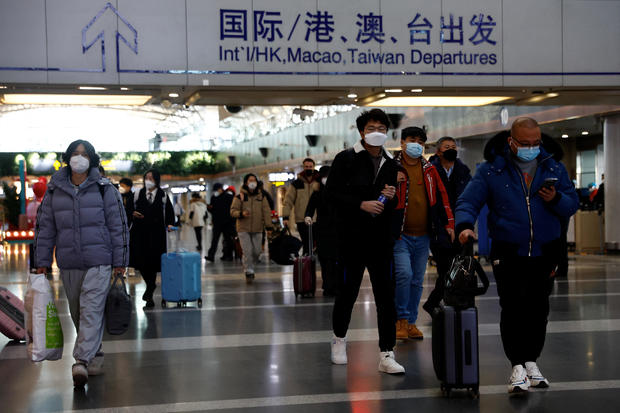China scrapping mandatory quarantining for people arriving from abroad
People in China reacted with joy and rushed to plan trips overseas Tuesday after Beijing said it would scrap mandatory COVIDquarantining for overseas arrivals, ending almost three years of self-imposed isolation.
In a snap move late Monday, China said from January 8 on, inbound travelers would no longer be required to quarantine on arrival — in a further unwinding of hardline coronavirus controls that had that torpedoed its economy and sparked nationwide protests.
The new policy will make it much easier for people who go abroad to return home, the Reuters news agency points out.
Cases have surged nationwide as key pillars of the containment policy have fallen away, with authorities acknowledging the outbreak is “impossible” to track and doing away with much-maligned official case tallies.
Beijing also narrowed the criteria by which COVID fatalities are counted last week, a move experts said would suppress the number of deaths attributable to the virus.
Still, many Chinese reacted with joy to the end of restrictions that have kept the country largely closed off to the outside world since March 2020.
“I felt like the epidemic is finally over,” said Beijing office worker Fan Chengcheng, 27. “The travel plans I made three years ago may now become a reality.”
TINGSHU WANG / REUTERS
Shanghai resident Ji Weihe said the move would make China “benefit the economy, peoples’ lives and their desires to go out and travel”.
Another Shanghai local, surnamed Du, said a swifter reopening may help the country reach herd immunity more quickly, adding that there was “no way to avoid” the virus now circulating in the eastern megacity.
Online searches for flights abroad surged on the news, with travel platform Tongcheng seeing an 850 percent jump in searches and a ten-fold jump in enquiries about visas, according to state media reports.
Rival platform Trip.com Group said the volume of searches for popular overseas destinations rose by 10 times year-over-year within half an hour of the announcement.
Users were particularly keen on trips to Macau, Hong Kong, Japan, Thailand and South Korea, it added.
But some Chinese may face hurdles when they do go abroad, with Japan announcing that it would require COVID-19 tests on arrival for travellers from mainland China beginning on Friday.
Rising cases in China, Prime Minister Fumio Kishida said, were “causing growing concern in Japan.”
The announcement effectively brought the curtain down on a zero-COVID regime of mass testing, strict lockdowns and long quarantines that has roiled supply chains and buffeted business engagement with the world’s second-largest economy.
“The overwhelming view is just relief,” said Tom Simpson, managing director for China at the China-Britain Business Council. “It brings an end to three years of very significant disruption.”
An uptick in international trade missions is now expected for next year, he told AFP, although the full resumption of business operations is likely to be “gradual” as airlines slowly bring more flights online and companies tweak their China strategies for 2023.
All passengers arriving in China have had to undergo mandatory centraliZed quarantine since March 2020. That decreased from three weeks to one week in June, and to five days last month.
The end of those rules in January will also see COVID-19 downgraded to a Class B infectious disease from Class A, a formal distinction that allows authorities to adopt looser controls.
Some entry restrictions remain in place, with China still largely suspending the issuance of visas for overseas tourists and students.
The Chinese government and state media have sought to portray an image of measured calm as COVID has finally washed across the country.
But officials in several major cities have said hundreds of thousands of people are estimated to have been infected in recent weeks.
Hospitals and crematoriums across the country have also been full with COVID patients and victims, according to independent reporting by AFP and other media.
Some studies have estimated around one million people could die in China from COVID over the next few months.
The Chinese government announced last week that it would effectively stop recording the number of people who were dying of COVID.
And Beijing’s National Health Commission (NHC) said Saturday it would no longer publish daily case figures.
The winter surge comes ahead of two major public holidays next month in which hundreds of millions of people are expected to travel to their hometowns to reunite with relatives.
For all the latest World News Click Here
For the latest news and updates, follow us on Google News.


